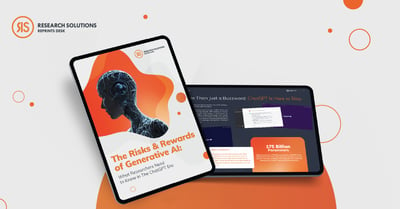We've explored the impact of Large Language Models (LLMs) on research technology, including valuable enhancements we've made to our own platform leveraging ChatGPT. These improvements involve semantic expansion, summarization, natural language querying, and posing questions about a document.
By harnessing this advancing technology, tools expedite the research process and help ensure that researchers find the best possible set of search results across various databases, including ResoluteAI's Foundation datasets.
At the convergence of utilizing LLMs for research, we stand at the crossroads of clinical trial data and academic research, accentuating the crucial role technology plays in fostering innovation. These advancements underscore the intersectionality of these domains and emphasize the significance of technological contributions in driving progress.
The Benefits of Connected Clinical Academic Research
For over a decade, there has been a concerted effort to establish consistent links between clinical trial information and the academic literature referencing each trial.
The benefits of these connections are clear:
- Improved dissemination of knowledge can result in enhanced patient care.
- Stronger correlations between clinical trial data and subsequent research can stimulate further exploration and innovation.
- Scholarly articles often emphasize patient involvement in clinical trials, facilitating a deeper understanding of real-world applicability.
The chart below showcases the number of completed clinical trials each year that have connected academic research.
.png?width=1755&height=1167&name=MicrosoftTeams-image%20(190).png)
Before the explicit connection between academic literature and clinical trials, the research process was often arduous and incomplete. However, with the establishment of direct connections, researchers now have more time to dedicate to analysis and insight gathering, rather than spending excessive amounts of time on searching. To facilitate this analysis, ResoluteAI, part of Research Solutions' product family, has leveraged these connections to enable researchers to generate Clinical Trial Literature Reviews. These reviews synthesize the papers associated with a clinical trial, creating a comprehensive report using ChatGPT.
We have further enhanced our ChatGPT integration by utilizing two interconnected databases and developing a feature for generating reports. Foundation, the scientific research and analysis platform, grants users access to scholarly content from PubMed and other reputable sources, along with clinical trial data from clinicaltrials.gov and other global repositories. Increasingly, research articles written about a specific clinical trial are connected to that clinical trial in PubMed.
Clinical Trial Literature Review Use Case: Exploring Semaglutide's Impact
Delving into an example demonstrating this technology at work in the realm of clinical trials, we look at the therapeutic efficacy of semaglutide, marketed as Ozempic.
Of the 339 clinical trials conducted on Ozempic, 76 have publications connected to them. This can be seen in the lower left-hand corner of the screenshot below.
.png?width=1200&height=798&name=MicrosoftTeams-image%20(193).png)
Using these connected articles, we have crafted a series of prompts that facilitate the creation of a Clinical Trial Literature Review. The user simply selects the clinical trial they are interested in and the corresponding academic research, and a comprehensive report will be generated summarizing the literature's findings.
For example, we’ve selected the following clinical trial: A Trial Investigating the Cardiovascular Safety of Oral Semaglutide in Subjects With Type 2 Diabetes (PIONEER 6) and these related articles from PubMed:
- Publication 1 (Efficacy and safety of oral semaglutide by subgroups of patient characteristics in the PIONEER phase 3 programme)
- Publication 2 (Semaglutide reduces cardiovascular events regardless of metformin use: a post hoc subgroup analysis of SUSTAIN 6 and PIONEER 6)
- Publication 3 (A population‐adjusted indirect comparison of cardiovascular benefits of once‐weekly subcutaneous semaglutide and dulaglutide in the treatment of patients with type 2 diabetes, with or without established cardiovascular disease)
- Publication 4 (Oral Semaglutide and Cardiovascular Outcomes in Patients with Type 2 Diabetes)
- Publication 5 (Cardiovascular safety of oral semaglutide in patients with type 2 diabetes: Rationale, design and patient baseline characteristics for the PIONEER 6 trial)
- Publication 6 (Cardiovascular Outcomes Trials in Type 2 Diabetes: Where Do We Go From Here? Reflections From aDiabetes CareEditors’ Expert Forum)
Within a matter of minutes, we successfully obtained a concise summary of the selected research pertaining to this clinical trial:
Results Of Published Research
Oral semaglutide showed greater reductions in HbA1c and body weight compared to comparators across most patient subgroups. Asian patients had greater HbA1c reductions with oral semaglutide compared to other racial groups. The overall incidence of adverse events was similar between oral semaglutide and comparators, with more gastrointestinal adverse events observed with oral semaglutide. The publication did not mention any specific results of the clinical trial. The study found that once-weekly subcutaneous semaglutide was associated with a statistically significant 35% reduction in major adverse cardiovascular events (MACE) compared to placebo. There was also a nonsignificantly greater reduction in MACE with semaglutide compared to dulaglutide. The trial of once-daily oral semaglutide in patients with type 2 diabetes demonstrated that the cardiovascular risk profile of oral semaglutide was not inferior to that of placebo. None of the publication abstracts mention specific results of clinical trials.
Summary Of Published Research
Publication 1 evaluated the efficacy and safety of oral semaglutide in patients with type 2 diabetes. The study found that oral semaglutide resulted in greater reductions in HbA1c and body weight across various patient characteristics, especially in patients with higher baseline HbA1c levels. The incidence of adverse events was similar between oral semaglutide and comparators. Publication 2 is a post hoc analysis and trial-level meta-analysis of cardiovascular outcome trials (CVOTs) involving semaglutide and other glucagon-like peptide-1 receptor agonists (GLP-1RAs) in patients with type 2 diabetes. The analysis found that the cardiovascular outcomes for semaglutide were similar regardless of baseline metformin use, suggesting that this finding may apply to all GLP-1RAs. This publication compared the cardiovascular effects of subcutaneous semaglutide and dulaglutide in patients with and without established cardiovascular disease. The study found that semaglutide was associated with a lower risk of MACE compared to placebo, and there was a greater reduction in MACE with semaglutide compared to dulaglutide, although not statistically significant. Publication 4 presents the results of a clinical trial assessing the cardiovascular outcomes of oral semaglutide in patients with type 2 diabetes. The trial showed that oral semaglutide was not inferior to placebo in terms of cardiovascular risk. Publication 5 discusses a multinational double-blind trial to assess the cardiovascular safety of oral semaglutide in patients with type 2 diabetes at high risk of CV events. Publication 6 provides an overview of the guidelines set in 2008 by the U.S. FDA for the development of antidiabetes drugs, and the subsequent cardiovascular outcomes trials that have been conducted.
These reports are generated in MS-Word so they can be easily enhanced, edited, and shared with colleagues. To generate this report, we utilize Retrieval-Augmented Generation, significantly reducing hallucinations in GenAI applications. The report is created exclusively from the information provided by the user in ChatGPT, without the inclusion of any training data from the ChatGPT corpus.
Streamlining Clinical Research Through AI
The rise in connected research has led to a greater number of clinical trials, which has transformed the nature of a researcher's work. However, this has also resulted in more demanding and time-consuming tasks. Leveraging an LLM to summarize and synthesize connected research can expedite these activities and offer valuable insights for the subsequent stages of the research process.
Free eBook Download: What Researchers Need to Know in the ChatGPT Era
In our latest eBook, we explore Generative AI technologies, specifically focusing on ChatGPT, examining how researchers are utilizing ChatGPT models, alongside the inherent opportunities they present and strategies to mitigate risk.
Our eBook, The Risks & Rewards of Generative AI: What Researchers Need to Know in the ChatGPT Era, sheds light on the influential and powerful role of ChatGPT in transforming the landscape of research. It addresses the efficient utilization of these capabilities and the challenges faced by industry leaders during this critical period of technological advancement. Download your free copy today!



